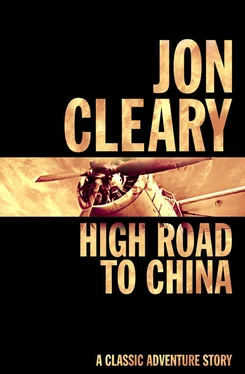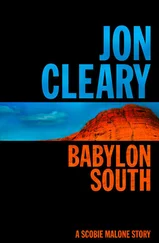‘I’m not going to bargain – ’
‘Neither am I!’ Miss Tozer was suddenly fierce. ‘You sound as if you’re putting a price tag on my father’s life!’
‘On the contrary. I was putting a price on our lives. I don’t think I’ve over-valued them. We’re cheaper than the machines you’re buying.’
‘I’m sorry.’ I had the idea that Miss Tozer was not accustomed to apologizing. I also had the idea I had hurt her and that hadn’t been my intention. ‘I’ll pay whatever you ask. Now may we please get down to planning the trip?’
I made tea, got out our four cracked and only cups, pulled the chairs and two boxes up to the kitchen table, spread out the maps and got down to planning an 8000-mile trip to China, everything to be ready within 24 hours. Moses, Columbus and Captain Cook, three other voyagers, would have laughed at us. The roll of maps George had scrounged took us only as far as Vienna. The rest of the proposed route, over which we had some argument, was sketched out on a school atlas on which the inky fingermarks of its former owner, some unknown juvenile, were sprinkled like a warlock’s mockery. I began to wonder what George and I had let ourselves in for. I felt like Columbus or Magellan, heading for the edge of the world, flying into an unknown sky.
‘We can’t take a direct route,’ George said. ‘We’ll have to fly by way of places where we can refuel. And there’s no guarantee we can do that all the way. There are bound to be stretches where they’ve never seen an aeroplane.’
‘We’ll have to risk that,’ said Miss Tozer. ‘Can you have everything ready by tomorrow morning?’
George nodded. ‘I’ve already asked half a dozen chaps to stand by to help us. I promised them a pound each if they would work right through the night – all right?’ Eve nodded, but Henty looked as if George had promised them life pensions. ‘I didn’t tell them where we are going, just that the machines have to stand up to some hard, long flying. They’ll have them ready in time.’
‘I’d like to take off at noon tomorrow. Is there anything I can get up in London, things we’ll need?’
I had been making out a list. ‘We want to keep things down to a minimum because of weight, but there are still essentials. You’d better get flying suits for you and Mr Sun – ’
‘Let the swine freeze,’ said George.
I ignored him. ‘We have our wartime suits. You’ll need some good strong boots – just in case we have to walk. We want a spare compass for each machine – and you’d better get us a spare sextant. Four sleeping bags, a Primus stove and eight water-bottles, two each. Make sure the bottles are silver or nickel-plated inside, the water tastes better. You can buy them at Hill’s in Haymarket. We’ll need a medicine kit – John Bell and Croyden in Wigmore Street will make up one for you. And maps – the best place will be the War Office.’
‘I’ll get those,’ said Henty.
‘We’ll supply the cooking things. A rifle will come in handy, just in case we have to shoot something for food. You can advise her on that, Henty.’
‘Miss Tozer has her own gun. I gather she is very competent with it.’
‘What do you shoot?’
‘Elephant, tiger. And the occasional man.’
George and I looked at her with cautious interest this time. Then George said, ‘We’ll bring our service pistols. And I’ll fit machine-guns – the ADC has some spares.’
‘Isn’t that illegal?’ said Henty. ‘I mean arming a civilian aeroplane?’
‘Yes,’ said George. ‘But we’ll be out of here before anyone knows. I’ll put a couple of Vickers forward on Bede’s and my machines and I’ll mount a couple of Lewis guns on the Scarff rings in our rear cockpits.’
‘I hope we shan’t need them,’ said Miss Tozer soberly.
We were all silent a moment. The machine-guns suddenly made the other equipment seem superfluous; George and Henty and I were all at once back to the values of war. For the first time it struck me that the actual flying to China might not be the worst part of the trip.
‘We’ll wait till they fire first,’ I said, denying a wartime principle. ‘Whoever they are.’
Hently took out a cheque-book and I left him to George, who was our book-keeper, when we had books to keep. I got up and went outside. Miss Tozer followed me. She took a cigarette from a gold case, fitted it into an ivory holder, looked at me.
‘I don’t smoke. I haven’t any matches, I’m afraid.’
She searched in her handbag, took out a box of matches fitted into a small gold case, handed it to me. I don’t think I was awkward with women, even in those days; but I was fumble-fingered just then. I had never lit a woman’s cigarette before; I held the spluttering match towards her like an apprentice on Guy Fawkes’s team. She smiled, puffed on the cigarette, then stood looking around the aerodrome as the last of the joyriding machines came gliding in.
‘Mr Henty told me you were an ace. Thirty-two aeroplanes, is that right?’ I nodded. Or 44 men, if you wanted to count it another way: some of the machines had been two-seaters, such as the Albatros C7. But I never counted it that way, couldn’t. ‘Do you miss it all? The war, I mean?’
‘No. Only lunatics and generals love war.’
That’s a glib statement these days, something you see on demonstrators’ banners, but no less true for being glib. But the Battle of the Somme was only four years behind us then: I July 1916, when the British Army alone lost 60,000 men, the day that finally put an end to the glory of war. I was there that Saturday morning, in the third wave to leave the trenches. I saw the men ahead of us going up the hill, strung out like a frieze against the skyline, a frieze quickly ripped to pieces as the German machine-guns cut them down. The second wave went on, never hesitating, just walking smack into death. When I led my platoon over the top I already knew half of them would not live to reach the top of the hill. They died like flowers under the scythe and by the time I reached the top of the hill and could go no further, was trapped in a shell crater with three dead men and another one dying, I wasn’t wanting to fight the Germans but to turn back and go hunting for the blind, stupid, living-in-the-past generals who had ordered this massacre. I survived that day and I didn’t go hunting the generals. Instead, I joined the Royal Flying Corps, where you were above the carnage and the muck and, if you had to die, you died a clean, sensible death.
‘I miss the thrill of flying, I mean the way we flew in the war. I’m grateful for this job, Miss Tozer. Not just for the money.’
‘It won’t be fun, Mr O’Malley. Not for me, anyway.’
‘I wasn’t thinking of it as fun. I was thinking that once again I’ll be flying an aeroplane somewhere for some purpose.’
I looked east, towards Kent, the Channel, France and everything that lay between us and China. In the foreground stood Mr Sun Nan, bowler-hatted, black-suited, patient-faced. I couldn’t hate him, not even if I’d had George’s prejudices. He was the one who had rescued me from Oxo and all the other graffiti I had planned to scrawl on the sky.
End of extract from O’Malley manuscript.
3
General Meng had started life with the burdening name of Swaying Flower: his mother, going against the grain, had wanted a daughter instead of a son. At the age of six, already ferocious, he had changed it to Tiger Claw; by the time he was eighteen and had already killed six men he had had half a dozen other names. Now, at fifty and with countless dead behind him, he called himself Lord of the Sword. He knew there were people who called him other names and if he chanced to hear them he terminated their opportunities to call anyone any name at all.
Читать дальше












